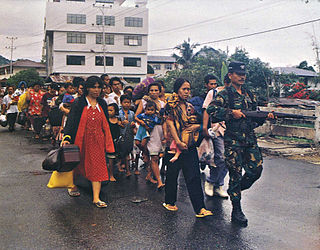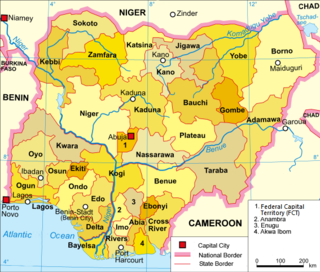Related Research Articles

Human rights in post-invasion Iraq have been the subject of concerns and controversies since the 2003 U.S. invasion. Concerns have been expressed about conduct by insurgents, the U.S.-led coalition forces and the Iraqi government. The U.S. is investigating several allegations of violations of international and internal standards of conduct in isolated incidents by its own forces and contractors. The UK is also conducting investigations of alleged human rights abuses by its forces. War crime tribunals and criminal prosecution of the numerous crimes by insurgents are likely years away. In late February 2009, the U.S. State Department released a report on the human rights situation in Iraq, looking back on the prior year (2008).
Human rights in Sri Lanka provides for fundamental rights in the country. The Sri Lanka Constitution states that every person is entitled to freedom of thought, conscience and religion, including the freedom to have or to adopt a religion or belief of his choice. And, that every person is equal before the law.

Human rights in Nigeria are protected under the current constitution of 1999. While Nigeria has made major improvements in human rights under this constitution, the American Human Rights Report of 2012 notes several areas where more improvement is needed, which includes: abuses by Boko Haram, killings by government forces, lack of social equality and issues with freedom of speech. The Human Rights Watch's 2015 World Report states that intensified violence by Boko Haram, restrictions of LGBT rights and government corruption continue to undermine the status of human rights in Nigeria.

The 2008 Jos riots were riots involving Christians and Muslims over the result of a local election on 28 and 29 November 2008 in Jos, a city in the Middle Belt region of Nigeria. Two days of rioting left hundreds injured and at least 761 dead. The Nigerian army was deployed and by 30 November order was restored.

The 2001 Jos riots were riots involving Christians and Muslims in Jos, Nigeria, over the appointment of a Muslim politician, Alhaji Muktar Mohammed, as local coordinator of the federal poverty alleviation program. The clashes started on 7 September and lasted nearly two weeks, ending on 17 September. Some 1,000 people were killed during the riots.
The war was waged for over a quarter of a century, with an estimated 70,000 killed by 2007. Immediately following the end of war, on 20 May 2009, the UN estimated a total of 80,000–100,000 deaths. However, in 2011, referring to the final phase of the war in 2009, the Report of the Secretary-General's Panel of Experts on Accountability in Sri Lanka stated, "A number of credible sources have estimated that there could have been as many as 40,000 civilian deaths." The large majority of these civilian deaths in the final phase of the war were said to have been caused by indiscriminate shelling by the Sri Lankan Armed Forces.

Boko Haram, officially known as Jamā'at Ahl as-Sunnah lid-Da'wah wa'l-Jihād, is an Islamist jihadist organization based in northeastern Nigeria, which is also active in Chad, Niger, northern Cameroon, and Mali. In 2016, the group split, resulting in the emergence of a hostile faction known as the Islamic State's West Africa Province.

The 2010 Jos riots were clashes between Muslim and Christian ethnic groups in central Nigeria in and near the city of Jos. The first spate of violence of 2010 started on 17 January in Jos and spread to surrounding communities. Houses, churches, mosques and vehicles were set ablaze, during at least four days of fighting. At least 326 people, and possibly more than a thousand, were killed.
Mohammed Chris Alli was a Nigerian Army major general who served as Chief of Army Staff from 1993 to 1994 under General Sani Abacha's regime and was military governor of Plateau State Nigeria from August 1985 to 1986 during the military regime of General Ibrahim Babangida. Many years later, he was appointed interim administrator of the state during a 2004 crisis in the state following ethno-religious killings in Shendam, Yelwa Local Government.

The Maluku sectarian conflict was a period of ethno-political conflict along religious lines that occurred in the Maluku Islands in Indonesia, with particularly serious disturbances on the islands of Ambon and Halmahera. The duration of the conflict is generally dated from the start of the Reformasi era in early 1999 to the signing of the Malino II Accord on 13 February 2002.
The Walisongo school massacre is the name given to a series of terrorists attacks by Christian militants on May 28, 2000, upon several predominantly Muslim villages around Poso town, Central Sulawesi, Indonesia as part of a broader sectarian conflict in the Poso region. Officially, the total number killed in the attacks is 367, but there is no definite figure of how many died. The number of dead is believed to be more than the 39 calculated from bodies later discovered in three mass graves, and equal to or below the 191 quoted by Muslim sources.

The Maspero Massacre initially started as demonstrations in October 2011 by a group dominated by Egyptian Copts in reaction to the demolition of a church in Upper Egypt claimed to be built without the appropriate license. The peaceful protesters who intended to stage a sit-in in front of the Maspiro television building were attacked by security forces and the army, resulting in 24 deaths, mostly among the Coptic protestors, and 212 injuries, most of which were sustained by Copts.

The 2000 Kaduna riots were religious riots in Kaduna involving Christians and Muslims over the introduction of sharia law in Kaduna State, Nigeria. It is unclear how many people were killed in the fighting between Muslims and Christians, that lasted with peaceful intervals from 21 February until 23 May 2000; estimates vary from 1,000 to 5,000 deaths.

The Miss World riots were a series of religiously motivated riots in the Nigerian city of Kaduna in November 2002, resulting in the deaths of more than 200 people. The Miss World beauty pageant, which was controversial in Nigeria, was relocated to London after bloody clashes between Muslims and Christians, caused by what some Muslims deemed to be a "blasphemous" article in the Christian newspaper ThisDay about the event. The Miss World riots were part of the Sharia conflict in Nigeria, that started in 1999 when several predominantly Islamic states in Northern Nigeria decided to introduce Sharia law.
There have been several instances of religious violence against Muslims since the partition of India in 1947, frequently in the form of violent attacks on Muslims by Hindu nationalist mobs that form a pattern of sporadic sectarian violence between the Hindu and Muslim communities. Over 10,000 people have been killed in Hindu-Muslim communal violence since 1950 in 6,933 instances of communal violence between 1954 and 1982.
Religious violence in Nigeria refers to Christian-Muslim strife in modern Nigeria, which can be traced back to 1953. Today, religious violence in Nigeria is dominated by the Boko Haram insurgency, which aims to establish an Islamic state in Nigeria. Since the turn of the 21st century, 62,000 Nigerian Christians have been killed by the terrorist group Boko Haram, Fulani herdsmen and other groups. The killings have been referred to as a silent genocide.
The 2015 Baga massacre was a series of mass killings carried out by the Boko Haram terrorist group in the north-eastern Nigerian town of Baga and its environs, in the state of Borno, between 3 January and 7 January 2015.
Herder–farmer conflicts in Nigeria are a series of disputes over arable land resources across Nigeria between the mostly-Muslim Fulani herders and the mostly-Christian non-Fulani farmers. The conflicts have been especially prominent in the Middle Belt since the return of democracy in 1999. More recently, they have deteriorated into attacks on farmers by Fulani herdsmen.

The Ngarbuh massacre took place in northwestern Cameroon on 14 February 2020 during the Anglophone Crisis, and resulted in the murder of 21 civilians, including 13 children, by Cameroonian soldiers and armed Fulani militia.
References
- 1 2 3 "Revenge in the Name of Religion", Human Rights Watch, 26 May 2005.
- 1 2 "God's Country", The Atlantic March 2008.
- ↑ BBC profile of Nigeria. BBC News (16 May 2013).
- ↑ "Nigerian Muslims struggle to cope after village massacre", The Guardian (8 May 2004).